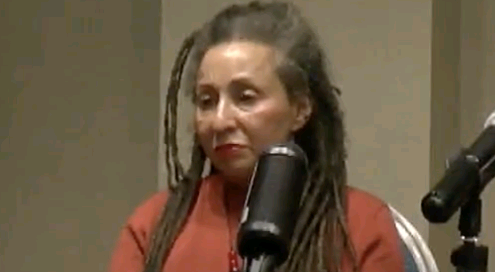This is a cross-post from Paul Canning
Simplistic and out of touch could be one recent impression of The Guardian’s publishing on Aboriginal people.
Take two current examples from the left presenting angry white, male and Western enviromentalist/socialist perspectives.
On the face of it, if you know nothing of the subject matter, Martin Lukacs ‘View from the North‘ on land rights and mining/drilling in Canada is an odd bit of writing.
He describes a meeting with a Master of The Universe (MOTU) on Wall Street, accompanied by (natch) rape apologist Naomi Wolf. The meeting’s aim being to push indigenous land rights as having legal force and hence that they should be counted in consideration of a country’s credit rating.
The MOTU, shock, agrees. Legally they may be right but “you and whose army” are going to enforce them.
Lukacs’ subsequent argument (it’s not really reporting) seems to be predicated on the idea that the battle over land rights in Canada will result in the end of mining/drilling. Literally, he seems to be arguing, Canada’s First Nations (as they are known) will ‘SAVE THE EARTH’ from climate change because, y’know, Aboriginal people, like the inhabitants of Pandora, don’t want ‘land rape’ …
Not all ‘Earth Warriors’
The other day I was watching ‘Mabo‘, the ABC drama about the Murray Islander whose long legal battle ended the concept of ‘Terra Nullius’ — empty land — which meant that he had no legal claim to ancestral land.
Eddie Mabo had all sorts of issues to deal with and one of them was his own people. In one of the first scenes in the drama the elders police his behavior on behalf of the white ‘protector’. Later fellows drop out of his legal claim and he is left alone.
The Aboriginal experience in Australia is not one experience and is not solely one of oppression by whites; the communities have their own internal problems, often ones experienced by lots of other communities and which come down to being human. Writers like Lukacs ignore all this grey.
Lukacs’ hope for humanity’s salvation via Aboriginal land rights is predicated on Aboriginal people not wanting any of that nasty mining/drilling. Now I don’t follow First Nations’ issues closely but a quick Google brings up negotiated settlements between nations and mining companies, here’s one signed a few days ago by a community on Vancouver Island:
Elliott called the potential deal “huge” for his people.”
“It’s going to create jobs,” he said.
Details on exactly how revenue would be shared between the company and the First nation have not been worked out yet, Elliot noted.
“I think any percentage is going to be significant,” he said.
“We’re going to have a big hand in how the whole project works.”
Elliott pointed to an agreement his council signed with Fortis B.C. worth $6 million. The First Nation also has stakes in forestry, aquaculture, petroleum and commercial construction.
“This (new) partnership is going to be 10 times, 20 times larger in the sense of creating opportunities for our members,” he said.
Now Canada may be having issues with such deals but clearly they exist and they sound, in terms of what Aboriginal leaders say, just like Aboriginal leaders elsewhere, just like those in Australia. They demand to be part of economic development.
Green/left Kryptonite
An Australia elder, Professor Marcia Langton, has caused consternation on the Green Left through her arguing that mining has been a massive economic plus for Aboriginal people:
When W.E.H. Stanner delivered the Boyer Lectures in 1968, After the Dreaming: Black and White Australians – An Anthropologist’s View, he gave credence, perhaps inadvertently, to the widely held assumption at that time that Aboriginal life was incompatible with modern economic life. Today, the expectation is quite the reverse.
The policies of federal governments for the past decade have made explicit the expectation that educational achievement and employability will be the key outcomes of spending in indigenous affairs portfolios. This is a view shared by most ordinary Australians.
But on the left, and among those opinion leaders who hang on to the idea of the new ”noble savage”, Aboriginal poverty is invisible, masked by their ”wilderness” ideology. Their unspoken expectation is that no Aboriginal group should become engaged in any economic development.
In her Boyer lecture Langton goes further, asking whether legendary environmental campaigner Tim Flannery had written something he intended to be “provocative and racist”. Langton has caused mass outrage of course as environmentalists and the left struggle to deal with her arguments (or resort to claims that she must be in the pay of the mining companies). Here you can see Langton speaking at last year’s Indigenous Business Enterprise and Corporations Conference.
It is of a pattern. Another Aboriginal elder, Noel Pearson, has faced similar exasperation from the left as he has worked on alternatives to welfare dependency.
So how does the Guardian, which is trying to expand its reach to Australia, deal with this issue of mining and Aboriginal people? It publishes a ‘woe-is-us’ essay by John Pilger which is entirely about mining and Aboriginal people and which ignores Langton, even though the area he focuses in on — the Pilbara in Western Australia — is her focus too.
Pilger silences the major Aboriginal voice contradicting him and ignores the huge debate in his supposed country that her Aboriginal elder’s voice has caused. What would you call that if it was not Pilger, the great white exposer of Australia’s historic sins, who was doing it? Dare I say racist?
Writes Russell Skelton in The Age:
The attacks on Langton could be filed away as nothing more than a monumental storm in a tiny teacup. But I believe there is something far more profound going on – given the level of vitriol, she has touched some exposed nerves.
What Langton is saying sits uncomfortably with the way the Aboriginal industry – activists, NGOs, Amnesty and anti-intervention groups – have stereotyped Aboriginal Australians as a powerless, downtrodden, oppressed minority living in a world of disadvantage fuelled by government neglect.
It’s a view that has its roots in our shocking colonial history and in the landmark battles fought in the 1970s when Gough Whitlam and Malcolm Fraser led the charge on land rights, native title, equal pay, access to welfare and unemployment benefits against a coalition of belligerent miners, ruthless pastoralists and recalcitrant state and territory governments. An essential part of Langton’s thesis is that times have changed, old ways of seeing are no longer useful.
Skelton says something which is like Green Left Kryptonite:
[The mining corporation] Rio Tinto has a far superior track record when it comes to creating skills and jobs than any government or NGO.
Australia ‘Closing the Gap’
What Pilger fails to tell the Guardian’s left/liberal British audience is that there has been an incredible development in Australia over the past decade. As I reported when comparing it to Australia’s sickening treatment of asylum seekers arriving by boat, there is now near universal and definitely bipartisan commitment to both Aboriginal development and facing up to history.
Pilger is flat out wrong when he claims that Australia is still trying to bury the past.
All political parties are committed to changing the constitution. Australian TV, as I have also reported, now features Aboriginal stories written, produced and directed by Aboriginal people in prime time and getting hit ratings and awards.
When Kevin Rudd apologised to the Stolen Generations in 2007 he also launched the bipartisan ‘Closing The Gap’ strategy of systematically meeting targets in education, housing and health. Five years on and one has been met, by the end of 2013 all Indigenous four-year-olds in remote communities will have access to early childhood education.
Australians are well aware of the problems — the ‘gap’ — which Pilger writes exclusively about. He is not telling any of them, that’s any Australians, urban/rural, right or left wing, anything they are not both knowledgeable about or concerned about.
Pilger comes with no solutions, none. That is something Australians are sick of and if The Guardian is going to get any traction in Australia it had better start publishing some thinkers coming with solutions, ideas to end the horrors Pilger describes, and not just old white lefties that Brits still think are relevant whilst Australia has moved on.
Edited to add: Just noticed that for the Guardian’s audio edition, which features the Pilger article, that they’ve picked a traditional, apparently stock, touristy image (pictured right) to illustrate rather than looked a bit harder for one of your average Aboriginal person.



